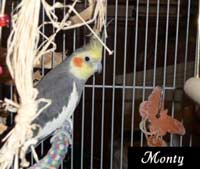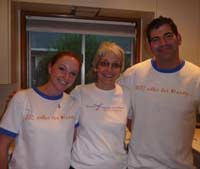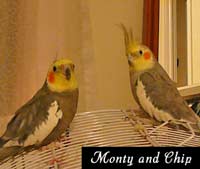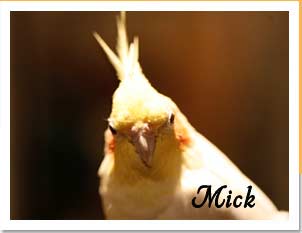Monty’s Flight Home
by Philippa Money, Maria Pangelina, Martha Kudlacik, and Jonathan HarrisWhen people imagine a vacation with their beloved, a Caribbean holiday might come to mind this time of year. Flying across the US to adopt a cockatiel probably would not. But that is exactly the choice Philippa Money and her fiancé, Frank, made last fall, when they swapped their trip to Aruba for a cross-country flight to adopt Monty the cockatiel from Mickaboo.

Well, almost. In truth, they had wanted to visit California for a while, so it was not that great a sacrifice. But they really did abandon the proposed Aruba vacation to fly out and adopt the little bird, going so far as to get special Monty tee-shirts made for the occasion.
Pip (Philippa) had been aware of Mickaboo for some time—even living in far-off New Jersey. She regularly visited Mickaboo’s website and read the bios posted there—not because she had plans to adopt a bird but simply for the mixture of happy and sad reading the stories provided. She respected Mickaboo’s ethics and diligence and liked its approach to bird adoption and fostering.
Having rescued two birds herself—a cockatiel named Chip and a Hahn’s mini-macaw, Beau, whom she describes as having been horribly abused—Pip felt a great deal of sympathy for the birds whose stories she read. She kept returning to the profile of one cockatiel in particular, an older grey male named Monty, whose last human companions had simply lost interest in him. He was a bit stand-offish with humans now but enjoyed the company of other tiels. His last foster mom reported that at one point when he had the option of staying alone in a private cage, he chose to move in with two other tiels. It was partly his story that attracted Pip, and partly his interest in other birds. And then there was his musicality. Monty loved to whistle, liked toys with bells, and was even inspired by the sound of vacuum cleaners—anathema for many birds. Pip thought Monty would be a perfect fit in her home and a great companion for Chip—"Music, love and an affectionate little cockatiel buddy."
The only problem was that Monty was over 2,500 miles away, and Mickaboo has a strict policy of not shipping birds. Shipping was the operative word, however—shipping, as luggage, in a cold, poorly pressurized baggage compartment. But if the bird could be taken in a carrier along with his humans in the passenger compartment (which some airlines allow), would that be all right? Cockatiel coordinator Maria Pangelina said it would be.
To which Pip thought,
"I have a week I was taking to go on vacation—it was actually a toss-up between Aruba and California, because I’ve wanted to go to both places. If I have this chance to get this little fellow and give him an awesome home, why not do it? There will always be another bird in need of a home or in need of rescuing, and I came across a story of one I strongly felt would be a wonderful fit, from a lovely organization, that I could give a happy 'forever home.' And the transportation details I could simply incorporate into a vacation I was going to take anyway."
While she was weighing her decision, Pip had printed out Monty’s picture from Mickaboo’s website and held it for Chip to see. Chip’s reaction, recorded in this video, is unmistakeable. (By the way, Pip says that Chip can talk clearly, but in this case he was too excited to make real words!)

So in late October, Pip and Frank arrived in San Francisco, vacationed here a week, and flew home with little Monty in tow. He tolerated the return flight well, but even in the passenger compartment, a long plane trip can be taxing for a bird. Monty had a slightly queasy stomach when they arrived and was a bit sleepy the next day, but otherwise he was no worse for wear.
Despite fatigue, Monty and Chip hit it off right away. Chip just adores his new brother, according to Pip. Cockatiels are naturally gregarious, and anyone who has watched two tiels meet, especially birds who have been living in isolation for awhile, knows the joy, the excitement, the chumminess, the long-lost-pal effusiveness that such encounters can produce. The moment he saw Monty, still in his carrier, Chip started singing his little heart out to him, and Monty whistled back. Chip has been singing to Monty a lot, trying to impress him. The two call to each other excitedly, Pip says, and they imitate each other’s calls almost exactly when one cannot see the other. They even have sung a duet or two. Chip also showed his devotion to Monty for a while by copying the newcomer’s every action. The day after Pip and Frank arrived home, Monty was having a late dinner and Chip decided he wanted a second course so that he could dine with Monty. Chip also copied Monty preening, napping, and snacking. "It was really quite adorable," says Pip. "I could almost hear the conversation: Chip:
"Oh! You want to have a snack? Me too!...You need a nap? I’m a little tired myself."

For his part, Monty always watches while Chip gets his night-time scritches just before Pip covers their cages. "Beau used to watch Chip and me," she recalls, "and I swear his observations played a large part in Beau’s recovery from abuse and learning to trust me more. I have very little doubt that Monty will be as tame as Chip in a fairly short period of time and that they’re going to be best buddies. Monty is ultimately a very laid back little fellow and adjusting beautifully."
In a note to Mickaboo, Pip expressed her profound thanks to all of the volunteers, especially Martha Kudlacik, Monty’s wonderful foster mom, and Maria Pangelina, who shepherded this unusual adoption and approved it in one of her last official acts as cockatiel coordinator.
"What an amazing couple!" Maria said. "This was a first for me … having an adopter travel across country to adopt from us. And it made it even more special to end my coordinating days with Pip and Frank."
"What a fabulous organization," wrote Pip. "I’ve never seen any like it and I’m thrilled to be a part of it and to have had the opportunity to adopt from Mickaboo."

